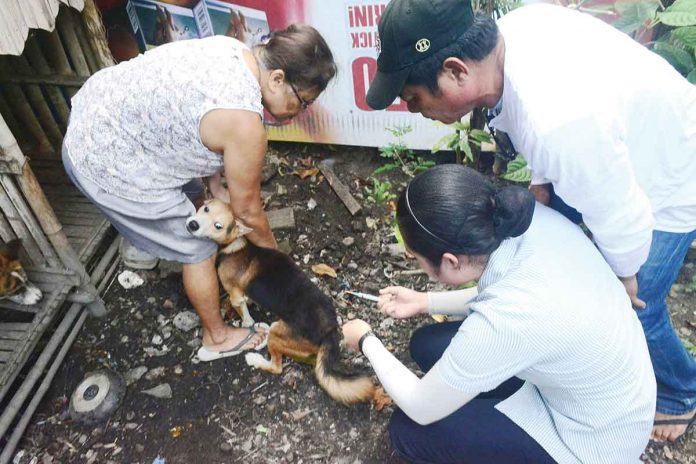
ILOILO – This province recorded just one rabies-related death from Jan. 1 to March 12 this year – a big 75 percent improvement from the four rabies deaths reported in the same period last year.
But for the Iloilo Provincial Health Office (IPHO), the campaign against rabies must continue, especially because some people still believe in the myth of traditional tandok treatment for rabies.
This was the case of the one rabies casualty of the province so far this year from the municipality of Balasan.
“Sang nakagat sang ido, nagpatandok. Wala ini nagkadto sa animal bite center so wala sia nahatagan sang rabies vaccine,” according to Ma. Jennifer Joy Oñate, health education promotion officer II of the Iloilo Provincial Health Office (IPHO).
Performed by traditional healers, tandok involves the use of an animal horn to supposedly extract the rabies virus from an animal-bitten patient.
Other forms of traditional animal bite treatment are rubbing garlic on the wounds and using black, porous stones.
When bitten – or even just scratched – by animals, most especially dogs, immediately wash the wound with clean water and apply topical antiseptic such as Betadine, said Oñate.
Do not rub the bitten area with garlic or force it to bleed, she stressed.
Instead, consult a doctor or go to the nearest animal bite center for free rabies vaccination, said Oñate.
“Usually nagahambal sila indi ta pagsapakon kay ginkaros lang ina sang ido. Indi gid pag-ibaliwala,” said Oñate.
Also, when bitten most especially by a dog, observe the dog for 10 days, she suggested.
If the dog weakens, it most likely is rabid and the person bitten should waste no time getting a rabies vaccine, said Oñate.
But an infected dog can transmit the rabies virus even before it becomes ill. It will invariably manifest signs and symptoms of rabies including change in behavior such as unprovoked aggressiveness and excitability, paralysis, and hydrophobia within five days, and die within two weeks, after it gets infected.
Rabies is a highly fatal viral disease. The rabies virus, which is present in the saliva of an infected animal, is passed to a human through a bite, or rarely, when the animal’s saliva gets in contact with a scratch or fresh break in the skin.
According to specialists, flu-like signs appear two to 12 weeks after a rabid dog bite; the virus incubates from four days but six years have been recorded.
Symptoms include anxiety, confusion, insomnia, agitation, hallucinations, and paralysis accompanied usually by hydrophobia.
Death occurs in two to 10 days after the first symptoms with a slim chance of survival even with intensive care.
In line with the observance of the Rabies Awareness Month, the IPHO is waging a rabies information drive down to the barangays. It is enlisting the help of Barangay Rabies Control Committees (BRCCs).
The duties of the BRCC include:
* conduct and supervise dog immunization activities and dog control measures
* maintain an updated master list/registry of all dogs, both vaccinated and the unvaccinated dogs
* regularly conduct information, education and communication campaign on rabies prevention and control
* advocate the practice of responsible pet ownership
* strict enforcement of barangay ordinance relevant to rabies prevention and control
* monitor cases of animal bites in the barangay and refer to the RHU for proper immunization
* support the municipal activities on rabies prevention and control
The IPHO also campaigns for responsible pet ownership as a way to curb rabies cases.
Under Section 5 of Republic Act 9482, or the Anti-Rabies Act of 2007, all pet owners are required to:
* maintain a registration card which shall contain all vaccinations conducted on their dog, for accurate record purposes
* submit their dogs for mandatory registration
* maintain control over their dog and not allow it to roam the streets or any public place without a leash
* provide dogs with proper grooming, adequate food and clean shelter
* within 24 hours, report immediately any dog biting incident to concerned officials for appropriate action, and place such dog under observation by a veterinarian
* assist the dog bite victim immediately and shoulder the medical expenses incurred and other incidental expenses relative to the victim’s injuries/PN





